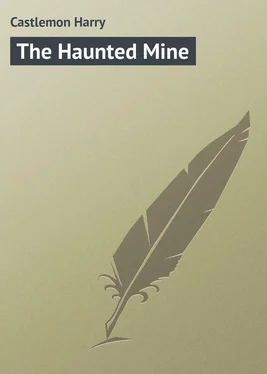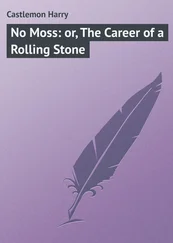Harry Castlemon - The Haunted Mine
Здесь есть возможность читать онлайн «Harry Castlemon - The Haunted Mine» — ознакомительный отрывок электронной книги совершенно бесплатно, а после прочтения отрывка купить полную версию. В некоторых случаях можно слушать аудио, скачать через торрент в формате fb2 и присутствует краткое содержание. Жанр: foreign_prose, foreign_children, на английском языке. Описание произведения, (предисловие) а так же отзывы посетителей доступны на портале библиотеки ЛибКат.
- Название:The Haunted Mine
- Автор:
- Жанр:
- Год:неизвестен
- ISBN:нет данных
- Рейтинг книги:4 / 5. Голосов: 1
-
Избранное:Добавить в избранное
- Отзывы:
-
Ваша оценка:
- 80
- 1
- 2
- 3
- 4
- 5
The Haunted Mine: краткое содержание, описание и аннотация
Предлагаем к чтению аннотацию, описание, краткое содержание или предисловие (зависит от того, что написал сам автор книги «The Haunted Mine»). Если вы не нашли необходимую информацию о книге — напишите в комментариях, мы постараемся отыскать её.
The Haunted Mine — читать онлайн ознакомительный отрывок
Ниже представлен текст книги, разбитый по страницам. Система сохранения места последней прочитанной страницы, позволяет с удобством читать онлайн бесплатно книгу «The Haunted Mine», без необходимости каждый раз заново искать на чём Вы остановились. Поставьте закладку, и сможете в любой момент перейти на страницу, на которой закончили чтение.
Интервал:
Закладка:
Castlemon Harry
The Haunted Mine
CHAPTER I
THE SALE OF "OLD HORSE."
"Going for twenty-five cents. Going once; going twice; going – "
"Thirty cents."
"Thirty cents! Gentlemen, I am really astonished at you. It is a disgrace for me to take notice of that bid. Why, just look at that box. A miser may have hidden the secret of a gold-mine in it. Here it is, neatly dovetailed, and put together with screws instead of nails; and who knows but that it contains the treasure of a lifetime hidden away under that lid? And I am bid only thirty cents for it. Do I hear any more? Won't somebody give me some more? Going for thirty cents once; going twice; going three times, and sold to that lucky fellow who stands there with a uniform on. I don't know what his name is. Step up there and take your purchase, my lad, and when you open that box, and see what is in it, just bless your lucky stars that you came to this office this afternoon to buy yourself rich."
It happened in the Adams Express office, and among those who always dropped around to see how things were going was the young fellow who had purchased the box. It was on the afternoon devoted to the sale of "old horse" – packages which had lain there for a long time and nobody had ever called for them. When the packages accumulated so rapidly that the company had about as many on hand as their storeroom could hold, an auctioneer was ordered to sell them off for whatever he could get. Of course nobody could tell what was in the packages, and somebody always bought them by guess. Sometimes he got more than his money's worth, and sometimes he did not. That very afternoon a man bought a package so large and heavy that he could scarcely lift it from the counter, and so certain was he that he had got something worth looking at that he did not take the package home with him, but borrowed a hammer from one of the clerks and opened it on the spot, the customers all gathering around him to see what he had. To the surprise of everybody, he turned out half a dozen bricks. A partner of the man to whom the box was addressed had been off somewhere to buy a brickyard, and, not satisfied with the productions of the yard, had enclosed the bricks to the man in St. Louis, to see how he liked them. The purchaser gazed in surprise at what he had brought, and then threw down the hammer and turned away; but by the time he got to the door the loud laughter of everybody in the office – and the office was always full at the sale of "old horse" – caused him to arrest his steps. By that time he himself was laughing.
"I'll tell you what it is, gentlemen," said he; "those bricks, which are not worth a nickel apiece, cost me just two dollars."
He was going on to say something more, but the roar that arose caused him to wait until it was all over. Then he went on:
"I have spent fifty dollars for 'old horse,' and if anybody ever knows me to spend another dollar in that way I will give him my head for a football. A man who comes here to squander his money for anything like that is a dunce, and ought to have a guardian appointed over him. I wish you all a very good day."
But in spite of this man's experience, Julian Gray had invested in this box because he thought there was something in it. He did not care for what the auctioneer said to him, for he talked that way to everybody; but Julian knew there were no bricks in it, for it was done up too neatly. The box was not more than twelve inches long and half as wide, and by shaking it up and down the boy became aware that there were papers of some kind in it. He paid the clerk the amount of his bid upon it, picked up his purchase, and started for the door, paying no heed to the remarks that were offered for his benefit. There he met another boy, dressed in a uniform similar to the one he himself wore, and stopped to exchange a few words with him.
"Well, you got something at last," said the boy. "It is not bricks, I can swear to that."
"No, sir, it is not," said Julian. "Lift it. It contains papers of some kind."
"Why don't you open it, and let us see what is in it?"
"I won't do that, either. I am not going to have the whole party laughing at me the way they served that man a little while ago. Come up to my room when Jack comes home, and then I will open it."
"I would not be in your boots for a good deal when Jack sees that box," said the boy, hurrying away. "He says you have no business to spend the small earnings you get on such gimcracks as 'old horse.'"
"I don't care," said Julian, settling the box under his arm and going away in the opposite direction. "I've got the box, and if Jack does not want to see what is in it, he need not look."
Julian broke into a run, – he knew he had no business to spend as much time in that express office as he had done, – and in a few minutes reached the headquarters of the Western Union Telegraph Company, in whose employ he was. He laid down his book of receipts for the dispatches he had delivered, then picked up his box again and stowed it away under the counter, where he was sure it would be out of everybody's way.
"I don't care," Julian repeated to himself, when he recalled what his older companion, Jack Shelden, would have to say to him when he found that he had been investing in "old horse." "I don't know that I expect to make anything out of it, but somehow or other I can't resist my curiosity to know what is in those bundles. When you can get the packages for little or nothing, where's the harm? But that is no way to save my money. I will never go near that express office again."
With this good resolution, Julian took his seat among the other boys and waited in silence for the operator to call upon him to deliver a dispatch. It came at last, and during the rest of the afternoon Julian was kept busy. When six o'clock came he put his box under his arm and started for home. His duties were done for that day.
The place that Julian called home was a long way from the office, for, being a poor boy, he was obliged to room where he could get it as cheaply as possible. He passed along several streets, turned numerous corners, and finally sprang up the stairs in a sorry-looking house which seemed almost ready to tumble down, and when he reached the top he found the door of his room open. There he met his chum, who had already returned from his work, going about his preparations for supper, and whistling as though he felt at peace with himself and all the world.
"Halloo!" he exclaimed, as Julian came in. "What's the news to-day? Well, there. If you haven't been to that old express office again!"
These two boys were orphans – or at least Jack was. Julian had a stepfather who, when his mother died, told the boy that he could not support him any longer, and that he must look out for himself. He no doubt expected that the boy would find himself in the poorhouse before he had been long out of his care; but Julian was not that sort of a fellow. He wandered aimlessly about the streets, looking for something to do, sleeping in dry-goods boxes or on a plank in some lumber-yard; and one morning, while passing along the street, wondering where he was going to get something to eat, he saw a scene that thrilled him with excitement. A span of horses was running away, and a telegraph operator – Julian knew that he was an operator from the uniform he wore – in making an attempt to stop them, lost his footing and fell on the ground right in front of the frantic team. Julian was nearer to him than anybody else, and acting upon the impulse of the moment, but scarcely knowing why he did so, he dashed forward, seized the young man by the shoulders, and pulled him out of the way. It was all done in an instant, and Julian shuddered when he thought of what he had done.
"Thank you, my lad," said the man, when he got up, brushed the dust from his clothes, and looked after the flying horses. "You saved my life, but you couldn't save the man in the buggy. Now, what can I give you?"
Читать дальшеИнтервал:
Закладка:
Похожие книги на «The Haunted Mine»
Представляем Вашему вниманию похожие книги на «The Haunted Mine» списком для выбора. Мы отобрали схожую по названию и смыслу литературу в надежде предоставить читателям больше вариантов отыскать новые, интересные, ещё непрочитанные произведения.
Обсуждение, отзывы о книге «The Haunted Mine» и просто собственные мнения читателей. Оставьте ваши комментарии, напишите, что Вы думаете о произведении, его смысле или главных героях. Укажите что конкретно понравилось, а что нет, и почему Вы так считаете.












